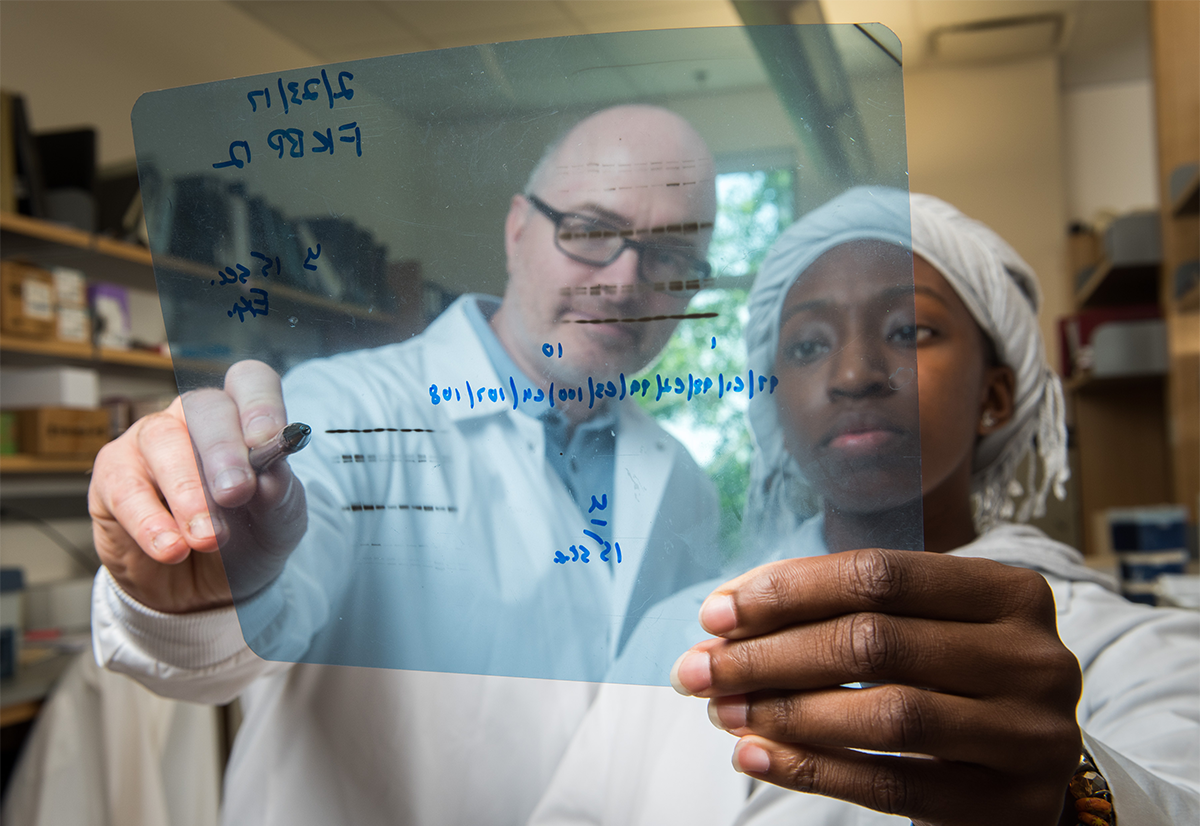Current fellows
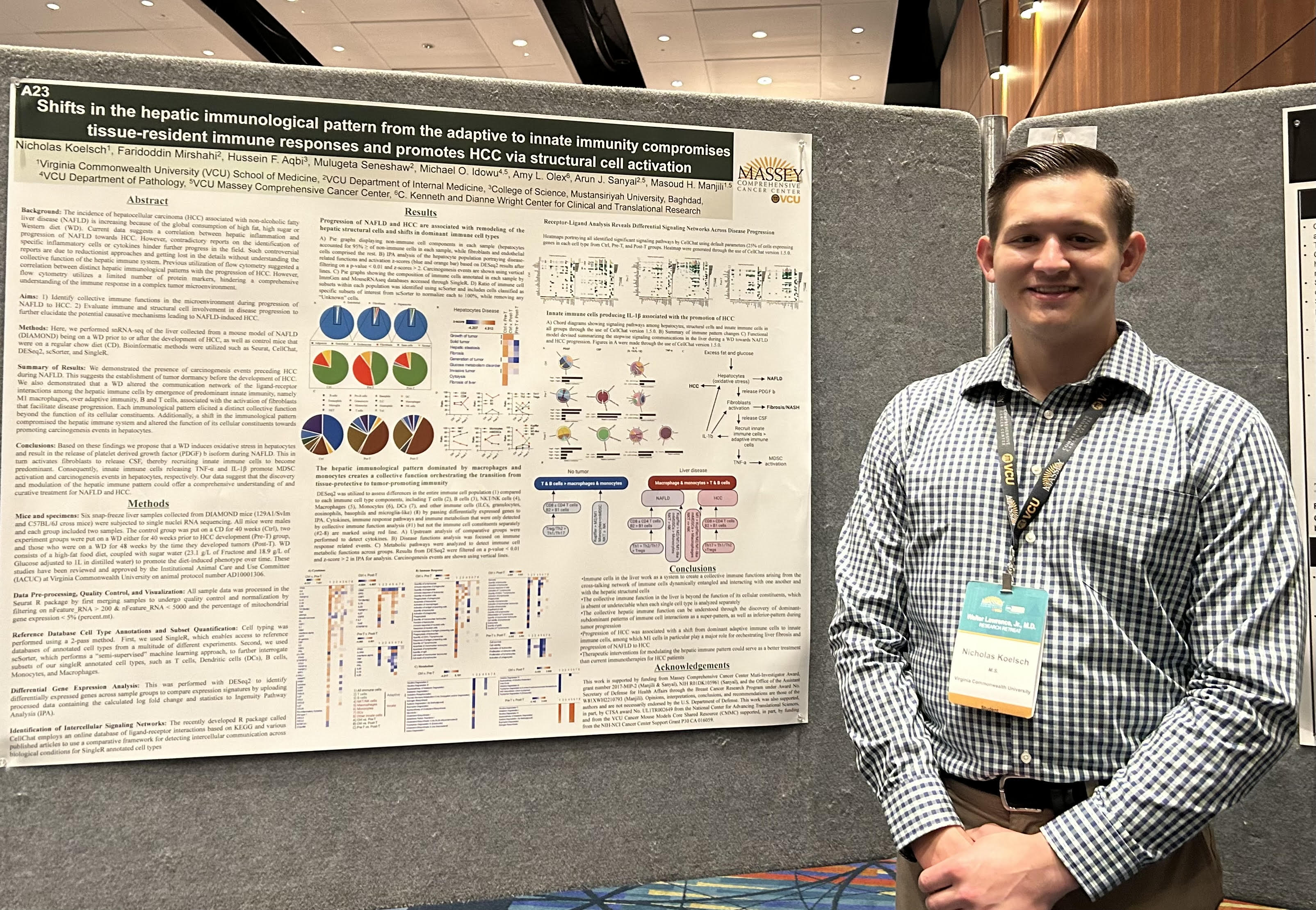 Nicholas Koelsch, M.S., is a predoctoral fellow in the NCI-funded T32 Integrative Training in Cancer Biology Research Training Program in the Department of Microbiology and Immunology at Massey. Mr. Koelsch received his M.S. in Microbiology and Immunology from the Virginia Commonwealth University, and his B.S. in Biology from Virginia Tech.
Nicholas Koelsch, M.S., is a predoctoral fellow in the NCI-funded T32 Integrative Training in Cancer Biology Research Training Program in the Department of Microbiology and Immunology at Massey. Mr. Koelsch received his M.S. in Microbiology and Immunology from the Virginia Commonwealth University, and his B.S. in Biology from Virginia Tech.
Research interests: Mr. Koelsch’s primary research field is systems immunology studying metabolic-associated fatty liver disease progression to hepatocellular carcinoma. He utilizes high-throughput single nuclei RNA-sequencing data to decipher the complex array of interactions within the liver microenvironment amongst immune and structural cells to study liver cancer development. Currently, he is researching sex-specific differences between males and females through preclinical mouse models of diet-induced liver disease, and how diet reversal strategies affect tumor development. These studies aim to identify novel perspectives through systems immunology to elucidate collective immune functions that can be used to modulate the hepatic microenvironment.
Mentors:
Masoud Manjili, Ph.D., D.V.M.
Professor, Department of Microbiology and Immunology
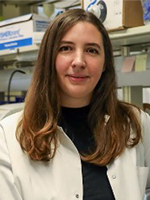
Krista Dalton, Ph.D., is a postdoctoral fellow in the NCI-funded T32 Integrative Training in Cancer Biology Research Training Program in the Department of Oral and Craniofacial Molecular Biology. Dr. Dalton received her doctoral degree in Oral Health Research with a concentration in cancer research from VCU Philips Institute for Oral Health Research.
Research interests: Dr. Dalton’s primary research is focused on investigating innovative targeted therapeutic strategies for difficult to treat cancers and the underlying biology driving sensitivity, with a high interest in pediatric cancers. Her research currently focuses on targeted therapies for the neuroblastoma.
Mentor: Anthony Faber, Ph.D.
Professor, Oral & Craniofacial Molecular Biology

Victoria Garcia, B.S., is a predoctoral fellow in the NCI-funded T32 Research Training Program in the Department of Pharmaceutics in the School of Pharmacy. Ms. Garcia received her Bachelor of Science in Biology from Texas Christian University.
Research interests: Ms. Garcia’s primary research field is focused on drug delivery, nanomedicine, and tumor immunology. Her research project focuses on evaluating the tumor immune microenvironment of osteosarcoma lung metastasis upon local lung delivery of combination chemo-immunotherapy. To enhance drug residence time in the lungs, we will investigate various lipid nanoparticle formulations designed for local lung delivery to enhance treatment outcomes.
Mentor: Larisa Litovchick, M.D., Ph.D.
Associate Professor, Internal Medicine
Associate Director, Medical Scientist Training Program

Nayyerehalsadat Hosseini, M.S., is a predoctoral fellow in the NCI-funded T32 [Integrative Training in Cancer Biology] Research Training Program in the Department of Pathology. She received her master in Genetics from the Azad University and is currently a PhD candidate in Human Genetics at VCU School of Medicine.
Research interests: Ms. Hosseini’s primary research field centers on understanding the molecular mechanisms underlying human health and disease, with a keen focus on cancer. She focuses on delineating the role of the protease DNA Damage Inducible 1 Homolog 2 (DDI2) in protein degradation pathways, specifically within the ubiquitin–proteasome system and the autophagy-lysosomal pathway, two vital intracellular protein degradation pathways whose modulation offers promising potential strategies to enhance cancer therapy. She is interested in translating these findings into therapies to help patients find their way through cancer.
Mentor: Senthil K. Radhakrishnan, Ph.D.
Associate Professor, Internal Medicine
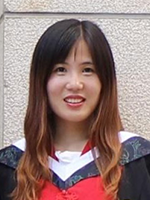
Dandan Huang, Ph.D., is a postdoctoral fellow in the NCI-funded T32 Integrative Training in Cancer Biology Research Training Program in the Department of Biochemistry and Molecular Biology. Dr. Huang received her PhD in Clinical Discipline of Chinese and Western Integrative Medicine from the Peking University.
Research interests: Dr. Huang’s primary research field is focused on lysosome function mediated by the bioactive sphingolipid metabolite ceramide, which is a crucial mechanism that triggers or promotes local inflammatory response due to inflammasome activation, ultimately leading to glomerular injury and sclerosis. As Dr. Huang progressed in her career, she found herself increasingly drawn to cancer biology and oncology and particularly the roles of bioactive sphingolipid metabolites. Dr. Huang’s research interests now are on the connection between metabolic disorders and pancreatic cancer, the most lethal cancer with an extremely poor survival rate.
Mentor: Sarah Spiegel, Ph.D.
Professor, Cellular, Molecular and Genetic Medicine
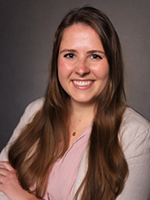
Polina Wright, B.A./B.S., is a predoctoral fellow in the NCI-funded T32 Integrative Training in Cancer Biology Research Training Program in the Clinical and Translational Sciences Program at Massey. Mrs. Wright received her Bachelor’s of Science and Bachelor’s of Arts in Biology and Spanish from VCU and is currently in the MSTP Program at VCU School of Medicine.
Research interests: Mrs. Wright’s primary research field is in cancer biology and translational research. She is currently working on her dissertation project investigating the role of Transglutaminase 2 on pancreatic cancer progression with hopes of targeting it therapeutically to improve patient outcomes.
Mentor: Azeddine Atfi, Ph.D.
Professor, Cellular, Molecular and Genetic Medicine
Alumni
Alexandra Straus, B.S., was a pre-doctoral fellow and a Ph.D candidate in the department of Biochemistry and Molecular Biology within VCU’s School of Medicine. Ms. Straus received her bachelor of science in Biology from George Washington University. She is incredibly passionate about community outreach and engagement and communicating health research data to non-science communities.
Research interests: Ms. Straus’ primary focus is on developing novel preclinical therapeutic strategies for colorectal cancer. Of note, Ms. Straus was invited to give the opening student presentation at the Gordon Ginder Innovations in Cancer Symposium in 2024. The topic of the symposium was the link between stress and cancer.
Current status: Postdoctoral Fellow, Virginia Commonwealth University

